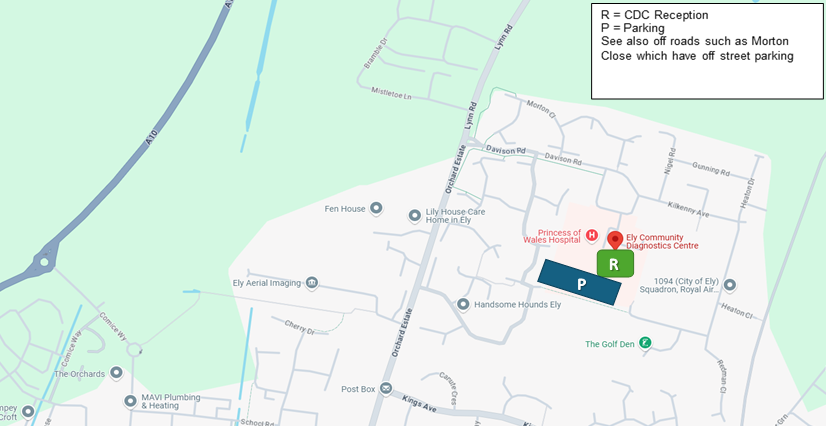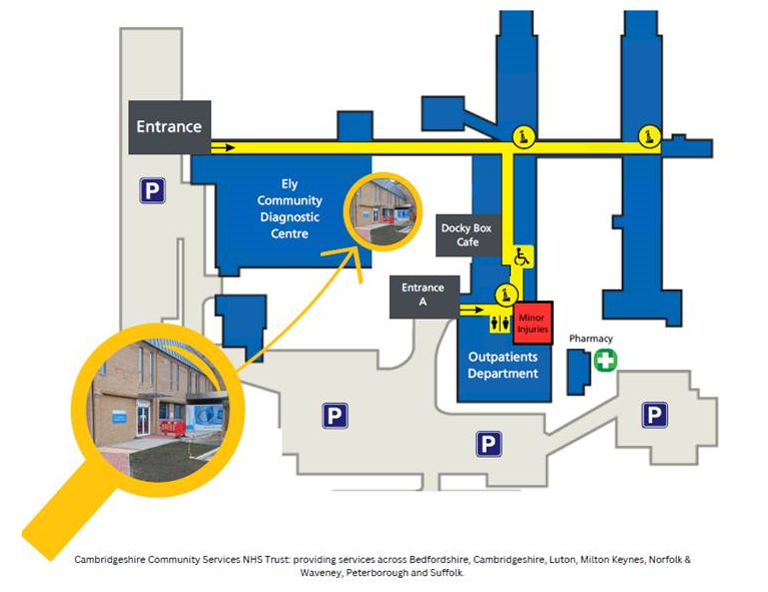Introduction
This information is for all patients undergoing MRI examinations at the Community Diagnostic Centre Ely (Princess of Wales Hospital)
We are pleased to announce the launch of a new Government strategy at the Community Diagnostic Centre Ely (Princess of Wales Hospital). Community Diagnostic Centres have been introduced to reduce the current waiting lists following the Covid-19 pandemic and to make diagnostic imaging more accessible to everyone by situating these facilities in the community.
This new MRI service is overseen by Cambridge University Hospitals NHS Foundation Trust (CUH).
Magnetic resonance imaging (MRI) is a medical imaging technique used in radiology to form pictures of the anatomy and the physiological processes of the body. MRI scanners use strong magnetic fields and radio waves to generate images of the the body. MRI does not involve X-rays or the use of ionizing radiation, which distinguishes it from CT and PET scans.
It is important to tell us beforehand on 01223 808522 or 01223 216667 if you:
- are pregnant or have any medical devices implanted (for example a pacemaker)
- are prescribed time sensitive medications e.g for Parkinson’s disease
- have been told by a doctor that you have kidney problems
- are unable to lie flat
- weigh 150kg or more
- need hospital transport
- have mobility issues
- are claustrophobic
How long will I be in the department?
This will depend on the type of scan you are having. MRI examinations can range from just a few minutes to over an hour.
What to do when you arrive?
There is free parking on site either at the front of the hospital or around the back, please see map below.
On arrival, please report to the Community Diagnostic Centre (CDC) reception area. This is located opposite the Docky Box Café. Please bring your letter and completed safety questionnaires with you on the day.
Staff you are likely to meet
- Reception staff
- Clinical support workers
- Radiographers
Preparation for procedure/examination
- Eat and drink normally before and after your scan unless the appointment letter gives you specific instructions.
Take all prescribed medications on the day of your scan as usual, unless otherwise advised on your appointment letter. Please contact us if you take timed medications and you need a specific appointment time e.g., medication for Parkinson’s disease
Benefits
MRI scans can give doctors information to help them diagnose a variety of conditions. The scans can help to confirm or rule out a suspected diagnosis, or occasionally identify a condition that was not suspected. Unlike other imaging methods, an MRI scan can give a detailed view of lots of different tissue types in the body, including lungs, bones, soft tissues and blood vessels.
Risks
- The scanner can be very loud, but ear protection is given and must be used.
- Some medical implants can be dangerous in an MRI environment. Please inform the MRI staff ahead of time.
- If you have an injection you might feel a cold flush or notice a metallic taste in your mouth.
- In rare cases, a small bruise may appear where the injection was given.
What will happen on the day of my procedure/examination?
- This will depend on what type of scan you are having. The radiographer will explain the procedure to you before your scan.
- Many MRI examinations involve having a dye injection (contrast) to increase the quality of information obtained from the scan.
- A small cannula may be inserted into a vein in your arm. The dye will be injected through this. It contains Gadobutrol or Gadoteric acid and is not radioactive.
- The injection usually causes nothing more than a cold feeling passing around your body.
- Most scans last 20 to 40 minutes.
- You might be given breathing instructions to follow during your scan.
Accessibility requirements
If you require support for your appointment, e.g. if you find it hard to hear, see or be understood by others, please let the receptionist or healthcare professional know on arrival or contact us by emailing CUH Accessibility or telephone: 01223 256998.
Pregnancy status
We have a legal responsibility to enquire if you are pregnant. Any patient aged between 12-55 years will be asked if there is a possibility they could be pregnant. This is important for us to know before you have your examination involving ionising radiation/before you enter the strong magnetic field of the scanner.
You can discuss this with a healthcare professional in private if you wish.
Medication
You can take your regular medications before an MRI scan. Routine medications (blood pressure, diabetes, antidepressants, etc.): Usually okay to take. Insulin or diabetes meds: If you are fasting for the MRI, check with your doctor. You may need to adjust the timing or dose of the medication.
Can I bring someone with me?
Those accompanying you will be required to stay out of the examination room during the procedure and remain in the waiting area. If you require support you may be able to bring a relative or a friend into the examination room. They will have to be screened by the radiographer before entering the room for safety.
Children accompanying parents
Staff are unable to look after or supervise children whilst your procedure/examination is taking place. Please make alternative arrangements for the care of your children whilst you attend for your procedure/examination. If you attend an appointment with children with no one to look after them whilst you have your examination/procedure, then your appointment will unfortunately have to be cancelled and rescheduled.
Personal belongings
Lockers are provided to lock any valuables/clothing away.
What happens after my procedure/examination?
- You will be able to go home shortly after the scan.
- You may eat and drink as normal.
- Continue to drink plenty of fluids for the remainder of the day, especially if you have been given an injection.
Possible side effects and additional aftercare
- Any injection into the body may cause an allergic reaction, this is very rare, and any high risks are screened using our relevant questionnaires.
- In the very unlikely case of a reaction, our staff are trained to give relevant support and aftercare.
- Patient information leaflets are available on request for Buscopan and our gadolinium based contrast agents
How, when and by whom will my results be communicated?
Imaging examinations are reported in order of clinical priority to ensure those with the highest urgency are reported first. Your referring team or clinician will be responsible for communicating reports back to you. Examination results are made available via MyChart but there are some delays from when an examination has been reported to when it is available on MyChart, in order to allow time for your clinical team to be able to see and action the results prior to them being released to the individual patient.
Are there any alternative tests?
Alternative imaging methods should be discussed with your referring Doctor.
Contacts/further Information
Ely CDC MRI 01223 808522 or 01223 808501
Addenbrooke’s MRI 01223 216667 or 01223 216559
Facilities available
Water machines
Docky Box café Mon- Fri 9:00- 2.30
Vending machines
Require leaflet in a different format or language?
The Recite Me toolbar makes our website digitally inclusive by allowing you to customise the contents so that it works best for you. It features an accessibility tools bar positioned at the top of webpage.
Key functions:
- Screen reader – option for all information on the website to be read aloud
- Translation – option to translate all information into over 100 different languages
- Styling and customisation – option to change the text, font style, size, colour and spacing so that the information is easier to read.
- Reading aids – including a screen mask (tint) and magnifier to help make the information more accessible for all.
Directions to the department

Address
Princess of Wales Hospital
Lynn Road
Ely
Cambs
CB6 1DN
Contact: 01223 808522
There is free parking available on site.
On arrival please report to Community Diagnostic Centre (CDC) reception area.

Question, concern or complaint
Firstly speak to a radiographer or other staff member as soon as you can so they can do their best to put things right straightaway.
If you don’t feel able to speak directly to the people caring for you, contact the patient advice and liaison service (PALS). Please call 01223 216756 10am to 3pm Monday to Friday, email CUH PALS (opens in a new tab), or via a form available via link on the CUH PALS webpage.
PALS is open every weekday, and you can leave a message in the evenings and weekends.
MyChart
We would encourage you to sign up for MyChart. This is the electronic patient portal at Cambridge University Hospitals that enables patients to securely access parts of their health record held within the hospital’s electronic patient record system (Epic). It is available via your home computer or mobile device.
More information is available on the MyChart Section on our website.
We are smoke-free
Smoking is not allowed anywhere on the hospital campus. For advice and support in quitting, contact your GP or the free NHS stop smoking helpline on 0800 169 0 169.
Other formats
Help accessing this information in other formats is available. To find out more about the services we provide, please visit our patient information help page (see link below) or telephone 01223 256998. www.cuh.nhs.uk/contact-us/accessible-information/
Contact us
Cambridge University Hospitals
NHS Foundation Trust
Hills Road, Cambridge
CB2 0QQ
Telephone +44 (0)1223 245151
https://www.cuh.nhs.uk/contact-us/contact-enquiries/

